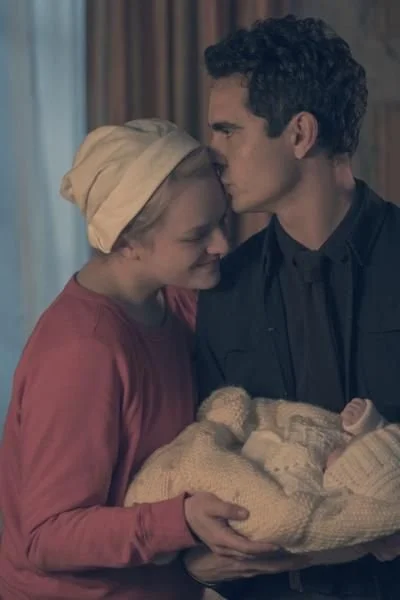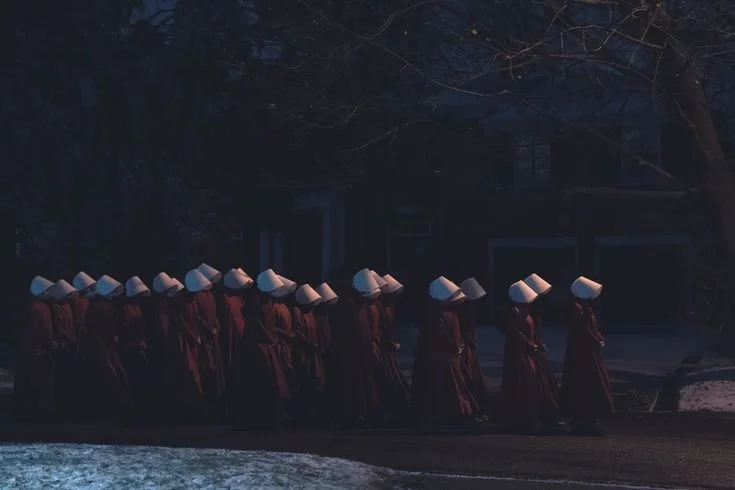Praise Be… I Guess?: On 'The Handmaid’s Tale' Finale
By Natalie McCarty
Sometimes I forget not everyone has watched The Handmaid’s Tale. Me, however? I grew up with this show. I interviewed the cast when I was still in college, before I had a career, before I had a byline. That panel, as modest as my involvement was, felt formative. I remember sitting in the Paley Museum in New York, absorbing everyone’s answers to questions and realizing I wanted to be part of this. Somewhere between Elisabeth Moss, Ann Dowd, and the rest of the cast's responses, I knew.
With tears in my eyes as I sat there, I became completely overwhelmed and enamored by the realization that film and television have the power to influence culture most directly. They reflect our biggest hopes, our darkest fears, and the political climates we live through. Storytelling can become a tool, used for resistance, for survival, for warning. At the time, the series felt like an urgent question. A cautionary tale about what could happen here if we weren’t careful.
Image Courtesy of Hulu
Now, several years later, I attended another panel for The Handmaid’s Tale, this time to celebrate its sixth and final season. It was again for PaleyFest, but now in Los Angeles. This experience felt different. It didn’t feel nostalgic or celebratory; it felt urgent as the room held a quiet sense of dread. Though they were discussing the finale of a fictional series, it felt more like a confrontation of the last pages of something that had always been real. The show may be over, but the world it warned us about is still unfolding.
Which is why the finale was difficult to sit through. Not because it was bad (it wasn’t, necessarily), but because it felt out of sync with the moment. The two episodes before it were louder, more emotionally charged, and far more ambitious. Commander Lawrence’s sacrifice in the penultimate episode stood out miles more than anything in the conclusion. And, of course, Nick’s death I can’t even find words for other than the words devastating, heartbreaking, and gut-wrenching.
Image Courtesy of Hulu
But the finale itself felt quiet and scattered. It read more like a meditation than a declaration. It was just missing that oomph. Maybe that was intentional, but it didn’t quite connect.
Tonally, the episode veered toward something surreal. There were long monologues delivered to children too young to understand them. Scenes floated through snow-covered landscapes and soft, dimly lit rooms. It felt far removed from the blood and soil of Gilead. Removed too from the searing, focused political commentary the show typically offers so sharply.
Still, I can understand the creative instinct behind it. How do you end a story like this? How do you close something built on the idea that the fight never really ends? Systems of control don’t vanish in a single episode, or even a single lifetime. Real liberation, when it comes, arrives slowly. Often without fanfare. And always with a lot of pain.
Image Courtesy of Hulu
Earlier seasons of The Handmaid’s Tale felt symbolic and metaphorical, but over time, the show started mirroring our headlines more directly. We watched as fiction blurred into reality: the overturning of Roe v. Wade, the removal of reproductive rights, the criminalization of miscarriage.
Then came the story of Adriana Smith, a 30-year-old nurse and mother from Georgia, declared brain dead in early 2025 and kept on life support against her family’s wishes because of the state’s six-week abortion ban. A woman reduced to an incubator. A mother denied dignity, even in death.
This was once a terrifying storyline on the show. It was a horrific plot point, even more hideous now that it’s real. And if that can happen, what else will?
So when I say the finale didn’t feel satisfying, it’s not because it left questions unanswered. It’s because the tension the show spent years building never broke, but rather it simply faded. There was no final act of defiance. No satisfying justice. No vision of power crumbling.
Just a little taste of it. Just June, alone. However, the ending monologue connecting to the opening lines of the show (yes, I just rewatched it from the beginning) was quite smart and poetic.
Anyway, maybe the ending was meant to reflect the world as it is now. Not healing, just waiting. A slow descent into something harder to name. I mean, it would make sense as The Handmaid’s Tale was never meant to comfort us. It was always meant to prepare us for a reality where comfort doesn’t come. Only resilience.
This show has taught a generation how to recognize danger. It has reminded us that silence is a choice, and often a deadly one. That we simply cannot let the bastards grind us down. That everyday is a choice and your voice, no matter how small it may feel, matters. And while I wish the ending had struck a sharper note, I also understand that sometimes the most haunting conclusions are the ones without closure.
Image Courtesy of Hulu
When a story ends without justice, without healing, without even the illusion of safety, it isn’t just unresolved. It’s a warning.
And maybe that’s exactly what the finale was meant to be.
Gilead was always a mirror. And right now, it’s still reflecting.




